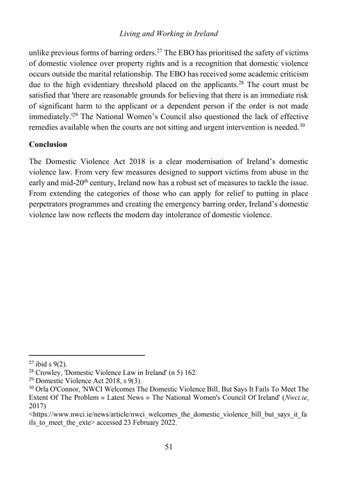Living and Working in Ireland unlike previous forms of barring orders.27 The EBO has prioritised the safety of victims of domestic violence over property rights and is a recognition that domestic violence occurs outside the marital relationship. The EBO has received some academic criticism due to the high evidentiary threshold placed on the applicants.28 The court must be satisfied that 'there are reasonable grounds for believing that there is an immediate risk of significant harm to the applicant or a dependent person if the order is not made immediately.'29 The National Women’s Council also questioned the lack of effective remedies available when the courts are not sitting and urgent intervention is needed. 30 Conclusion The Domestic Violence Act 2018 is a clear modernisation of Ireland’s domestic violence law. From very few measures designed to support victims from abuse in the early and mid-20th century, Ireland now has a robust set of measures to tackle the issue. From extending the categories of those who can apply for relief to putting in place perpetrators programmes and creating the emergency barring order, Ireland’s domestic violence law now reflects the modern day intolerance of domestic violence.
27
ibid s 9(2). Crowley, 'Domestic Violence Law in Ireland' (n 5) 162. 29 Domestic Violence Act 2018, s 9(3). 30 Orla O'Connor, 'NWCI Welcomes The Domestic Violence Bill, But Says It Fails To Meet The Extent Of The Problem » Latest News » The National Women's Council Of Ireland' (Nwci.ie, 2017) <https://www.nwci.ie/news/article/nwci_welcomes_the_domestic_violence_bill_but_says_it_fa ils_to_meet_the_exte> accessed 23 February 2022. 28
51

